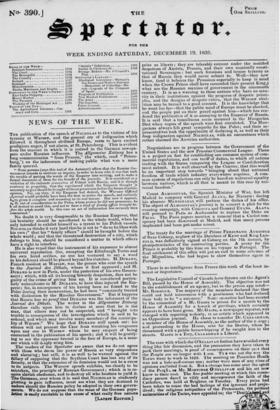NEWS OF THE WEEK.
THE publication of the speech of NICHOLAS to the victims of his tyranny at Warsaw, and the general cry of indignation which followed it throughout civilized Europe, seem to have excited prodigious anger, if not alarm, at St. Petersburg. This is evident from the manner in which it is noticed in the German newspa- pers under Russian influence. The Allgemeine Zeitung has a long communication " from Prussia," (for which, read " Peters- burg,") on the indecorum of making public what was a mere family quarrel.
" Some persons (says this tool of the Autocrat) affirm that the Russian Go- vernment intends to institute an inquiry, in order to learn who it was that took the trouble of putting the words of the Emperor into writing, and to make a formal document of them for the benefit of the journals. It IS considered as a violation of the intimate connexion of Poland with Russia, and it is though c ontrary to propriety, that the reprimand which the Emperor thought it necessary to give should be brought without permission before the forum of public opinion. For, say they, if the Emperor had desired, the Warsaw Official journal would probably have been the first to notice the speech, and certainly have given it complete and according to its real tenour. But now it appears, as if, out of consideration to the Poles, whose praises he did not pronounce, he II ad desired to avoid this, and not to have a hind of family affair brought be- fore the whole world. In this case an act of indiscretion has certainly been committed."
No doubt it is very disagreeable to the Russian Emperor, that Lis brutality should be manifested to the whole world, when he only intended to exhibit himself as a tyrant to his Polish vassals. NICHOLAS thinks it very hard that he is not to "do as he likes with his own ;" that his "family affairs" should be brought before the whole world ; and that the threatened destruction of a city, which belongs to him, should be considered a matter in which others have a right to interfere. He is tile') vexed that the instrument of his exposure to almost universal reprobation (for, excepting the Edinburgh Tories and his own hired scribes, no one has ventured to say a word in his defence) should be placed beyond his clutches. M. DURAND, French resident at Warsaw, was the person who sent the speech to the Journal des Debuts, where it first appeared; and M. DURAND is now in Paris, under the protection of his own Govern- ment; which, with all its leaning towards despotism, dare not be guilty of the crime of giving him up. It is considered particu- larly unhandsome in M. DURAND. to have thus injured the Em- peror; for, in consequence of his having been no friend to the Poles during their insurrection, he had been "constantly treated with distinction by the Russian Government." But it happens that Russia has no proof that DURAND was the informant of the Journal des Dibats. The writer in the Allgemeine Zeitung therefore calls upon him to declare at once that he is the man, that others may not be suspected, and " brought into trouble in consequence of the investigation which is said to be ordered, and which may involve many members of the municipa- lity of Warsaw." We hope that DURAND will speak out: his silence will not present the Czar from wreaking his vengeance upon any one in Warsaw whom he may suspect of being concerned in the publicatiou of his speech; and it will be gratify- ing to see the oppressor braved in the face of Europe, in a man- ner which will deeply sting him. The readers of the Spectator are aware that we do not agree with those who deem the power of Russia so very stupendous and alarming; but still, it is as well to be warned against the fallacy of supposing that the Scythian Court has lost any of its ferocity, or that the extension of its dominion would not be a curse to its subjects. The Warsaw speech exhibits, too clearly to be mistaken, the principle of Russian Government ; which is to re- nuire slavish obedience, and to destroy all who hesitate to yield it. The Germans, over whom it is said that NICHOLAS is studiously plotting to gain influence, must see what they are destined to endure should the Russian policy be adopted in their own govern- ments. We do not suppose that the mass of the German popu- lation is easily excitable in the cause of what really free nations prize as liberty; they are tolerably content under the modified despotism of Austria, Prussia, and their own nominally consti- tutional Sovereigns : but such ferocious and insane tyranny as that of Russia they would never submit to. Well—they now know, (and it behoves the Prussians especially to keep in mind when the Crown Prince shall have succeeded their present King,) what are the Russian maxims of government in the nineteenth century. It is as a warning to those nations who have no secu- rity in their institutions against the progress of despotic princi- ples, and the designs of despotic rulers, that the Warsaw ebul- lition may be turned to a good account. It is the knowledge that he went too far—that the public mind of Europe must be shocked, and the people put on their guard against him—which has ren- dered the publication of it so annoying to the Emperor of Russia. It is said that a tumultuous scene occurred in the Hungarian Diet when copies of the speech were first circulated. The Hun- garians always felt great sympathy for the Poles; and their re- presentatives took the opportunity of declaring it, as well as their deep indignation against Nictionas, with an earnestness which rather alarmed the Austrian authorities.


























